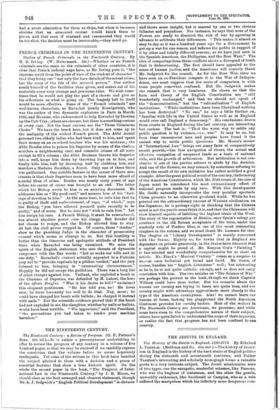criminals are the same as the criminals of other countries,
it is clear that French judicial ways have, as Mr. Irving puts it, "the supreme merit from the point of view of the student of character" that they bring out "not only the bare details of the actual crime, but the story of the life of the accused person." Our author avails himself of the facilities thus given, and makes out of his materials some very strange and gruesome tales. We wish some-
times that he would not play the part of a chorus and give us his reflections on what is going on. The tragedy left to itself would be more effective. Some of the "French criminals" are well-known characters, as Ravachol (really Koenigstein), who was the author of two dynamite explosions in Paris in March, 1$92, and Meunier, who endeavoured to help Ravachol by blowing up the Cafe Very; others are obscure, but there is something curious in every case. Not the least curious are the "Three Criminons Clerks." We have the breed here, but it does not come up to the malignity of the wicked French priest. The Abbe Auriol poisoned two elderly ladies who had been kind to him, and spent their money on an ex.school-teacher who was his mistress ; the Abbe Boudes tries to poison his Superior by means of the chalice, murders a neighbouring cure, and commits crimes of all sorts enough to fill a column ; the Abbe Bruneau throws his Superior into a well, keeps him down by throwing logs on to him, and finally kills him, half by drowning, half by clubbing him, and murders a Madame Bourdais, a florist. Only one of these three was guillotined. One notable feature in the career of these mis- creants is that their Superiors seem to have been more afraid of scandal than of crime. Boudes was nearly sixty years of age before his career of crime was brought to an end. The letter which his Bishop wrote to him is an, amazing document. He addresses him as "My good cure," and assures him of his "feel- ings of devotion to him." At the same time, he tells him that he is guilty of theft and embezzlement, of rape, "of which," says the Bishop, "you have allowed yourself quite recently to be guilty," and of arson. But he does not "wish to ruin him." Let him resign his cure. A French Bishop, it must be remembered, has almost absolute power over his clergy. But Boudes did not choose to resign, and the Bishop allowed him to stay. At last the civil power stepped in. Of course, these "studies" show us the presiding Judge in the character of prosecuting counsel which seems so strange to us. But this hostility is better than the timorous and apologetic attitude of President Giles when Ravachol was being examined. We miss the spirit of the English statesman who met threats of dynamite vengeance with the line words : "Let us make our wills and do our duty." Ravachors counsel actually appealed to a Parisian jury not to "provoke reprisals by a pitiless verdict," and the jury listened to him, bringing in "extenuating circumstances." Happily he did not escape the guillotine. There was a long list of other charges against him. Vaillant, who exploded a bomb in the Chamber of Deputies, was defended by M. Labori, the hero of the offaire Dreyfus. "Was it his desire to kill ?" exclaimed this eloquent gentleman. "He has told you, no ! He loves men, he loves humanity too well to do that. Nay, more ; he could have charged his bomb with bullets ; he charged it instead with nails." But the scientific evidence proved that if the bomb had not exploded in air, the slaughter, whether by nails or bullets, would have been terrible. "We appreciate," said the President, "the precautions you had taken to render your machine harmless."




















































 Previous page
Previous page